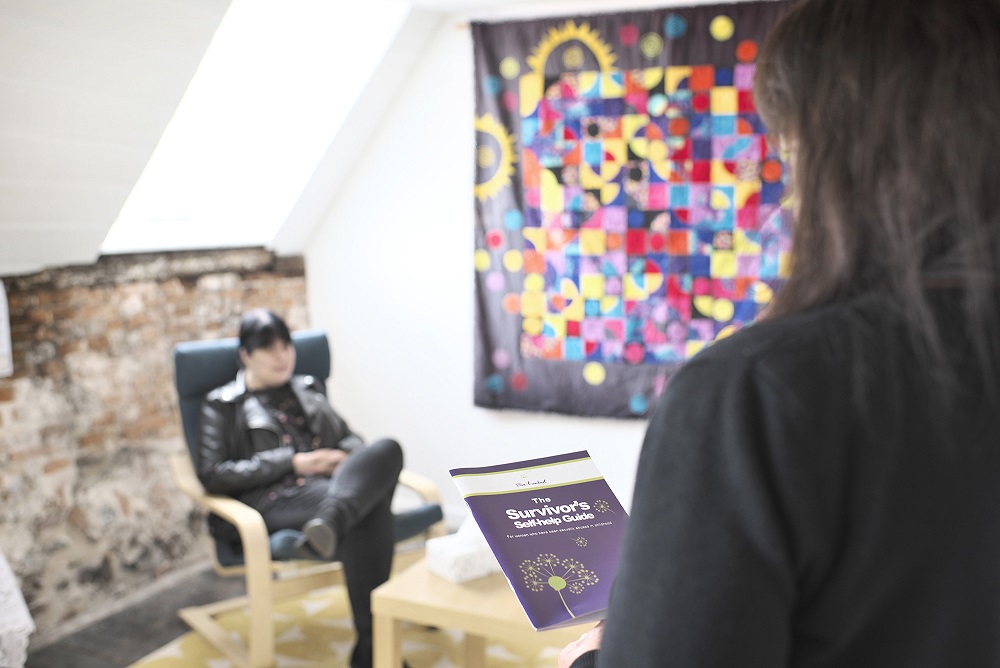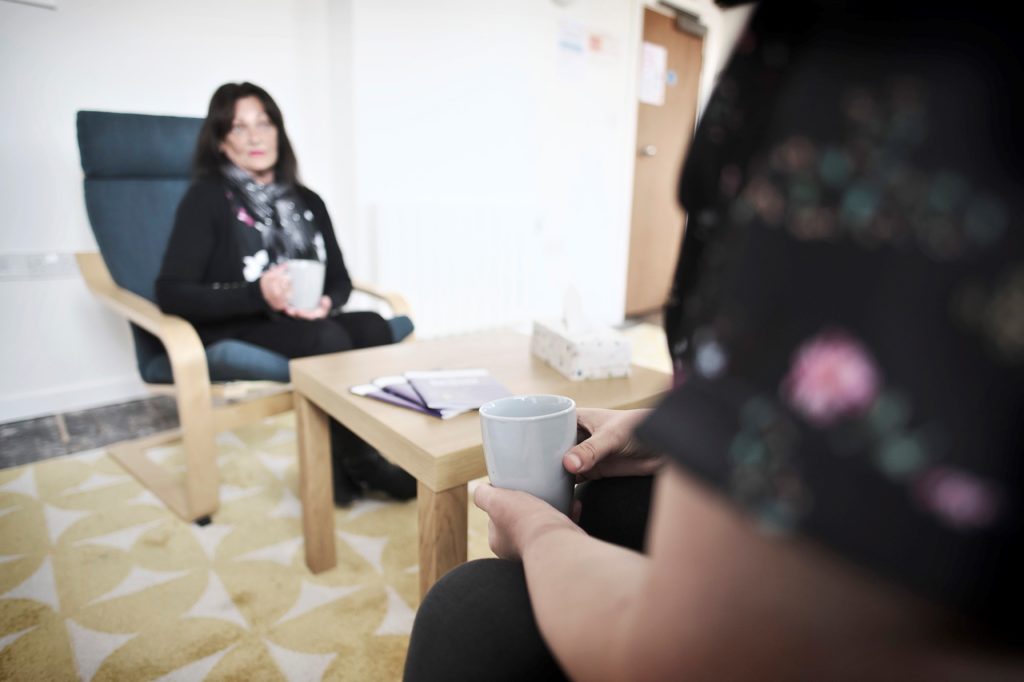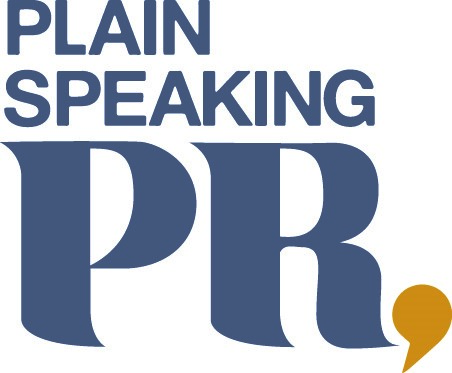
Clive Evans is the chief executive of Sue Lambert Trust, which supports people who have experienced sexual violence, sexual and domestic abuse in Norfolk. Here, the former Head of Music at MTV explains the personal reasons why he chose to become CEO – and why he is in awe of the volunteer counsellors
Looking back I feel grateful and privileged for all the opportunities that have come my way – from leaving school at 18 to living in Sri Lanka for a year; being at the core of popular music in the 90’s as Head of Music for MTV; moving to live in Rome when I was 24; following my interest and passion in the 00’s by joining the British Red Cross which gave me the opportunity to travel extensively and meet many interesting people; in the 2010’s working with many different national and local charities to now – becoming the CEO of Sue Lambert Trust in 2020 which is an absolute privilege.
Also, in parallel, seeing and being part of the developments in society and changes in legislation which allowed me to marry my husband in 2017 and to then become foster parents to our wonderful foster son in 2018. Whilst there have been some significant challenges along the way I do look back and feel very humble that life has afforded me all these opportunities.
I initially set out to pursue my passions and work in music, television, and theatre. However, my mother was always a positive influence on me growing up and she and the Welsh community I lived in always viewed charitable work or supporting each other as an integral part of life. This is a natural part of my character and something I fulfilled more and more as I grew older. There is a very personal reason why I chose to become CEO of Sue Lambert Trust, in that I am a survivor of childhood sexual abuse. I felt that working as CEO at Sue Lambert Trust I could bring all my professional experience to lead the charity but also share direct empathy with the experiences of every client we support.

We are Norfolk’s specialist charity for supporting people who have experienced sexual abuse, sexual assault, or domestic abuse. We provide free of charge therapeutic counselling and specialist support services to help people heal and rebuild their lives, no matter when the abuse took place. Some people contact us several decades after the abuse or assault took place, when they feel ready to talk and to work through their trauma.
From personal experience and from my time at Sue Lambert Trust, sexual and domestic abuse devastates lives. It does lead to significant mental and physical ill health, breakdown of relationships and families, cause employment and financial difficulties, homelessness, self-harming behaviours including the use of drugs and alcohol and sadly also suicide. It doesn’t have to be that way.
At Sue Lambert Trust, we aim to change this by providing a safe, caring, and supportive space for survivors to heal, recover and build their resilience and move towards living their fulfilled life.
Working in Norfolk, our network of 69 volunteer counsellors and 21 members of staff supports over 300 people a week. We help people to understand the impact of what has happened to them, regain their confidence and make preparations for moving towards the life they wish for and deserve.
Sadly, the demand for our services outstrips our capacity to support everyone immediately. Whilst we can support 300 people a week, there is constantly another 300 people waiting to access our support. On average, we’re contacted by one new person asking for our support, every day.
Currently we have two centres in Norfolk. Music House Lane in Norwich and King Street in Great Yarmouth, with six counselling rooms in Norwich and five in Great Yarmouth. We also provide therapy via video and telephone which some prefer. This also means that we can be there for people throughout Norfolk, no matter where they live. We’ve started exploring satellite venues too, so we can get out into the community more, which are a mixture of counsellors own private practice rooms and community venues.

At the outset, the start of the pandemic was a very anxious and concerning time with nobody able to predict how everything was going to develop. However, through the hard work and dedication of the staff and volunteers we were able to move people to online video or telephone therapy, where people were able to access these safely. For some clients, who were not able to access these easily, we kept in touch to make sure they were ok and to address any needs they may have had at the time. Most of us felt quite vulnerable during this period and all the lockdowns made it very isolating – and for people who were already feeling vulnerable, it was even more challenging, and we did see some of our clients experience a significant deterioration of their wellbeing. It was a very tricky time, but by being able to continue with Sue Lambert Trust’s therapy online and for other clients, having the reminder that we were still there for them, no matter what, I believe we managed to support most to the best of our abilities.
A hugely worrying time, the pandemic did also present us with a silver lining. Moving therapy online opened a vast number of opportunities for Sue Lambert Trust including increasing our weekly therapy sessions from 200 pre-pandemic to 300 now, as we were no longer limited by our own bricks and mortar. As a knock-on, we increased our capacity as we were able to decrease the average waiting time for accessing our support.
Over the pandemic demand remained static. I think the situation focussed people’s attention to other immediate issues such as how to stay safe and avoid Covid. However, as we began to emerge from the final lockdown and society started to feel more ’normal’, we did witness a significant increase in demand for our support. In one month more than four people daily were bravely coming forward looking for help and support.

We would love to get to a position where, after someone contacts us, we’re able to respond and start delivering their programme of support within weeks. However, that means more resource and capacity and to do this we require more professionally qualified volunteer counsellors at all levels. Currently we have 69 volunteer counsellors who are incredible. We are so grateful that they dedicate their professional time, skills and expertise to us, and our clients, for free. I am in awe of what they do. What they can achieve, working together with our clients, and the integrity and skills they bring with them are essential to our service. Each counsellor brings something unique and personally, I am humbled and feel privileged to be part of this story.
For our counsellors, Sue Lambert Trust provides clinical supervision which is a stipulation for their ongoing counselling accreditation, continuous professional development and training and a staff team that supports them daily to achieve life changing outcomes with our clients.
As a charity, we are reliant on funding and the good will of the public. We receive grants from the Office of the Police and Crime Commissioner in Norfolk, Ministry of Justice, the NHS, the National Lottery and many other generous Trusts and Foundations. However, every year we do have to raise additional funds to meet the costs of running our services which comes from the generosity of the general public who recognises the significant and positive impact Sue Lambert Trust has on the lives of so many people in Norfolk.
We have people taking part in Run Norwich this year, the London Marathon, and this August two fundraisers will be scaling Ben Nevis. We are very grateful for everything our fundraisers do. But, like so many charities, we always need more funds to do more good work.
A donation means we can continue to achieve this life changing and often critical support for people who have experienced indescribable trauma and continue to deal with the impact on their lives. For anyone who would like to support us and donate, please visit www.suelamberttrust.org
Sadly, demand does outstrip our capacity to support everyone immediately. But we want anyone reading this who thinks they could benefit from our support, to get in touch. If your life continues to be affected by the trauma of sexual abuse or sexual assault, Sue Lambert Trust is here for you.
Coming forward for support is an incredibly significant and courageous moment for anyone and we want to reassure people that while there may be a waiting list for support to start, making that call to us is the beginning of your journey of healing, recovery and re-building resilience. Sue Lambert Trust will be by your side throughout.
With our person-centred ethos, we ensure that our clients lead the work, which is incredibly vital to the success we are able to achieve. However, this does mean that sometimes we are working with people for up to 12 months or longer (when required) which does impact on the time other people are then waiting for the support.
One area of our work which we have grown over the past year is our Groundwork Programme. This means that while people wait for counselling to start, we can help them in other ways – addressing any practical needs such as housing, access to benefits and other practical issues. We also talk about and develop skills to help people self-manage the symptoms of trauma and put strategies in place to manage these, such as, nightmares, flashbacks, emotional dysregulation, stress and anxiety. And whilst on the waiting list, if people want us to, we make check-in calls to reassure people that we are still there for them and to make sure things aren’t becoming too overwhelming whilst they are waiting.
Very soon, we will be rolling out an emotional skills programme at various wellbeing hubs located across the county, including Rest in Norwich. This rollout is exciting in itself but by basing a new Sue Lambert Trust service within the wellbeing hubs will enable us to collaborate and work in partnership with other mental health organisations, as we aim to provide the very best support for our clients.
Visit www.suelamberttrust.org; Instagram @sue.lambert.trust; Facebook and Twitter @SLTNorfolk
Featured image of Clive Evans, CEO of Sue Lambert Trust, picture credit: Julian Claxton









Leave a Reply